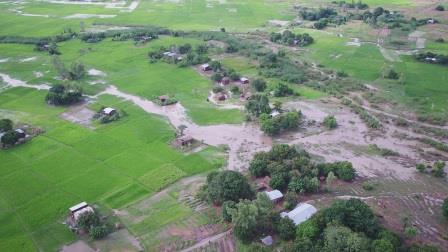News & Updates
Interview with Matthias Boyen, UNICEF Malawi
29 November 2017

How is UNICEF involved in humanitarian and development sectors?
UNICEF has a long history of working in emergencies and humanitarian contexts, both natural and man-made. Originally called the United Nations International Children’s Emergency Fund, the organisation was created to provide humanitarian assistance to children living in a world shattered by the Second World War. Much has changed since then, but UNICEF’s fundamental mission has not.
Mainstreaming of humanitarian action within UNICEF’s overall programmes both at the global level and country level will be maintained because it provides unique opportunities to better link humanitarian response with development programmes to both build resilience and promote rapid recovery and transitions, especially in conflict affected and/or disaster-prone countries.
How is UNICEF represented in East Africa?
UNICEF is represented throughout East Africa with country offices and national and international staff who work with government counterparts and non-governmental organisations in the areas of health, HIV/AIDS, education, child protection, nutrition, social protection and water, sanitation and hygiene.

What does your role at UNICEF entail and what initiatives are you involved in?
With UNICEF Malawi, I am managing the use of drones for disaster preparedness and response. Concretely that means that my main focus is to bridge the gap between drone flights/acquisition of data and the end-user. Through the information generated from aerial images the government can be more effective in responding to the needs of communities, especially women and children.
I also assist the team at UNICEF Malawi, which supports the government in the development of the regulations and integration of the health supply chain system with drones. Moreover I was involved in setting up Africa`s first humanitarian drone test corridor.
Which are your main priorities for 2017/2018?
One of the main priorities is to enhance Malawi’s capacity to respond more effectively to floods and other disasters.
In 2018 UNICEF plans to enhance the drone ecosystem across Malawi with an aim to create a country-wide drone network which provides greater coordination across stakeholders.
What will your presentation at the Aid & Development Africa Summit address and why is it important for those attending to engage in this topic?
My presentation will focus on integration of drones in humanitarian action, preparedness and response. I hope to inform about how we can respond more efficiently and effectively to floods and other natural hazards through the use of drone-acquired imagery.
What is your impression of the upcoming Aid & Development Africa Summit 2018 so far?
I expect to learn from innovators around the region and rest of the world to address localised challenges with new technologies using approaches involving the communities.
Why is it important for you and UNICEF to engage in such events?
The Aid & Development Africa Summit is an excellent event to share our experiences and lessons learned with a broader public than we usually reach.
* * *
Matthias Boyen, Drone Focal Point, HIV/AIDS Support Project Officer, UNICEF will take part in a panel looking at technology in Africa and how phones and drones are transforming healthcare at the 3rd Aid & Development Africa Summit on 27-28 February 2018 at the Safari Park Hotel in Nairobi, Kenya.
For more information on UNICEF Malawi, visit www.unicef.org/malawi. For more information on the Aid & Development Africa Summit, visit www.africa.aidforum.org or email Alina O’Keeffe, Head of Marketing, AIDF at marketing@aidforum.org
